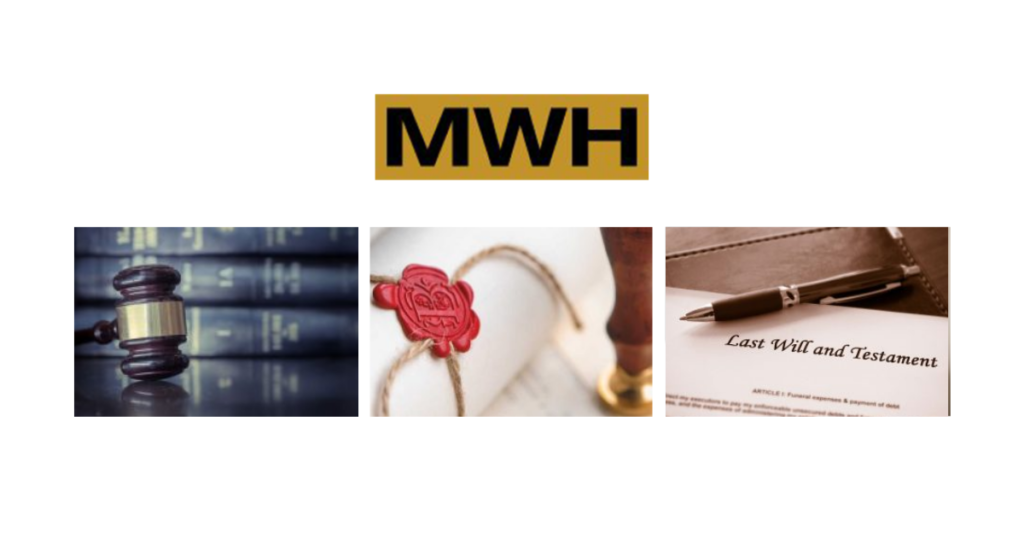With life’s uncertainties, have you considered what will happen to your assets and loved ones after you? Understanding the significance of estate planning is crucial to ensure your wishes are carried out. In this blog post, we will probe into the importance of estate planning and provide valuable insights from The Law Office of Matthew W. Harris to guide you through this necessary process. Let’s launch on this journey together to secure your legacy.
Key Takeaways:
- Estate planning ensures your assets are distributed according to your wishes: By creating a comprehensive estate plan, you can ensure that your assets are passed on to your chosen beneficiaries.
- Protecting your loved ones: Estate planning allows you to protect your loved ones not just financially, but also by appointing guardians for minor children and establishing healthcare directives.
- Avoiding probate and minimizing taxes: Through effective estate planning, you can potentially avoid the lengthy and expensive probate process, as well as minimize estate taxes, ensuring that more of your assets go to your intended beneficiaries.
The Necessity of Estate Planning
Avoiding Family Feuds
To avoid family feuds and potential conflicts among your loved ones, estate planning is important. Without a clear plan in place, decisions regarding your assets and personal belongings may be left up to the discretion of the court or state laws. This lack of direction can lead to disagreements and strained relationships between family members.
Protecting Your Legacy
To protect your legacy and ensure that your assets are distributed according to your wishes, estate planning is crucial. By creating a comprehensive estate plan, you can designate who will receive your property, how it will be distributed, and under what circumstances. This not only allows you to safeguard your legacy but also provides peace of mind knowing that your loved ones will be taken care of after you’re gone.
Necessity: Without a proper estate plan in place, your legacy and assets may be at risk of being mismanaged or not distributed according to your wishes. By taking the time to create a solid estate plan with the help of a knowledgeable attorney, you can rest assured that your legacy will be protected and preserved for future generations.
Family disputes can arise when there is ambiguity or uncertainty surrounding an individual’s estate. By clearly outlining your wishes through an estate plan, you can help prevent conflicts and ensure that your loved ones are provided for in the way you intended.
Common Estate Planning Mistakes
Procrastination: The Thief of Time
One common estate planning mistake is procrastination. You might think you have all the time in the world to create a plan for your estate, but time can slip away faster than you realize. Putting off estate planning can lead to complications down the road, leaving your loved ones in a difficult situation.
Lack of Communication: A Recipe for Disaster
An necessary aspect of estate planning is communication. Failing to have open and honest discussions with your family members about your wishes and plans can create confusion and conflict after you’re gone. It’s crucial to have these conversations now to ensure that everyone is on the same page and understands your intentions.
Estate planning is not just about legal documents; it’s also about fostering understanding and unity within your family. By communicating openly about your estate plans, you can help prevent misunderstandings and disputes that may arise in the future.
Ignoring the Importance of Wills and Trusts
The importance of wills and trusts in estate planning cannot be overstated. These legal documents outline how you want your assets distributed and who will be responsible for carrying out your wishes. Ignoring the creation of wills and trusts can result in your assets being distributed according to state laws, rather than your preferences.
This oversight can lead to unnecessary delays, expenses, and potential conflicts among your heirs. By taking the time to create wills and trusts that reflect your desires, you can provide clarity and peace of mind for both yourself and your loved ones.
The Benefits of Estate Planning
Unlike many people, you may think that estate planning is only for the wealthy or the elderly. However, the truth is that estate planning is imperative for everyone, regardless of age or financial status. Proper estate planning can bring you and your loved ones numerous benefits that go beyond just managing your assets.
Peace of Mind for You and Your Loved Ones
Estate planning provides you with the peace of mind that comes from knowing your affairs are in order. By creating a comprehensive estate plan, you can ensure that your assets will be distributed according to your wishes after you pass away. This can help alleviate stress and conflict among your family members and loved ones during an already difficult time.
Minimizing Taxes and Probate Fees
Probate is the legal process of validating a will and distributing assets after someone passes away. By engaging in estate planning, you can minimize the taxes and probate fees associated with transferring your assets to your beneficiaries. This means more of your hard-earned money can go to your loved ones instead of being tied up in court costs and taxes.
Minimizing taxes and probate fees can also help expedite the process of transferring your assets to your heirs, ensuring they receive their inheritance in a timely manner.
Ensuring Your Wishes Are Respected
For many people, estate planning is not just about managing assets but also about ensuring that their wishes are respected when they are no longer able to communicate them. By clearly outlining your healthcare preferences, appointing a trusted individual to make financial decisions on your behalf, and specifying how you want your assets distributed, you can have peace of mind knowing that your wishes will be followed.
The benefits of estate planning go far beyond just financial considerations. It provides you with the opportunity to take control of crucial decisions that will impact both you and your loved ones in the future.
Essential Components of an Estate Plan
Despite the discomfort that often comes with considering your own mortality, creating an estate plan is a crucial step to ensure your wishes are carried out and your loved ones are provided for after you’re gone. There are several key components to a comprehensive estate plan that you should carefully consider to protect your assets and provide for the future.
Wills: The Foundation of Estate Planning
Wills are the cornerstone of any estate plan. They allow you to dictate how your assets will be distributed upon your death and designate guardians for any minor children you have. Without a valid will in place, state laws will determine how your property is divided, which may not align with your wishes. By creating a will, you can provide clarity and peace of mind for your loved ones.
Trusts: A Smart Way to Distribute Assets
On the topic of trusts, they offer a flexible and powerful tool for distributing your assets according to your wishes. Trusts can help you avoid probate, maintain privacy, and provide ongoing financial management for beneficiaries, especially minor children or individuals who may not be financially savvy. By setting up a trust, you can ensure that your assets are protected and distributed in a controlled manner.
Smartly considering a trust as part of your estate plan can also offer tax benefits and protection from creditors. Trusts come in various forms, such as revocable living trusts, irrevocable trusts, and special needs trusts, each serving unique purposes based on your specific circumstances. Consulting with an experienced estate planning attorney can help you determine the most suitable trust structure to achieve your goals.
Powers of Attorney: Empowering Your Loved Ones
An vital component of estate planning is establishing powers of attorney to designate individuals who can make financial and healthcare decisions on your behalf if you become incapacitated. By appointing trusted agents to act on your behalf, you ensure that your financial affairs are managed and your medical preferences are followed according to your wishes. This designation can provide peace of mind for you and your loved ones during challenging times.
Plus, having powers of attorney in place can potentially help avoid costly and time-consuming court proceedings, such as guardianship or conservatorship hearings, that may arise if you become unable to make decisions for yourself. Be sure to discuss your preferences with your designated agents and provide clear instructions to guide them in carrying out their responsibilities effectively.
Special Considerations for Unique Situations
Blended Families: Navigating Complex Relationships
Not all families fit the traditional mold, and estate planning for blended families can present unique challenges. Navigating complex relationships between stepchildren and biological children, as well as between ex-spouses and current partners, requires careful consideration. By working with an experienced estate planning attorney, you can ensure that your assets are distributed according to your wishes and that the needs of all family members are taken into account.
Business Owners: Protecting Your Legacy and Livelihood
One important aspect of estate planning for business owners is safeguarding the future of your company. You have worked hard to build your business, and it is crucial to have a plan in place to protect your legacy and ensure its continued success. By incorporating business succession planning into your estate strategy, you can designate successors, outline ownership transfer details, and address any potential tax implications.
Livelihood: In addition to protecting your business, estate planning can also safeguard your personal assets and provide for your loved ones in the event of your passing. By establishing trusts, setting up life insurance policies, and creating a comprehensive estate plan, you can secure your family’s financial future and ensure that they are taken care of when you are no longer around.
Special Needs Planning: Ensuring a Secure Future
Any individual with a disability or special needs requires specific considerations in estate planning to ensure their ongoing care and financial security. By setting up special needs trusts, you can provide for your loved one without jeopardizing their eligibility for government benefits. Working with a knowledgeable estate planning attorney can help you navigate the complexities of special needs planning and create a plan that meets your family member’s unique needs.
Relationships: It’s important to remember that estate planning is not a one-size-fits-all solution. Each family situation is different, and it’s crucial to tailor your estate plan to address the specific needs and dynamics of your loved ones. By seeking guidance from a skilled attorney like Matthew W. Harris, you can create a personalized estate plan that protects your assets and provides for your family’s future.
The Role of Professionals in Estate Planning
Attorneys: Your Guides Through the Process
Many times, estate planning can feel overwhelming and complex. That’s where attorneys come in to assist you. Planning your estate involves making important decisions about your assets and the future of your loved ones. An experienced estate planning attorney can guide you through the process, helping you understand all the legal implications and options available to you.
Financial Advisors: Helping You Make Informed Decisions
To ensure your estate plan aligns with your financial goals, seeking the advice of a financial advisor is crucial. Financial advisors can provide valuable insights and help you make informed decisions regarding investments, retirement planning, and tax implications. They work in tandem with your attorney to create a comprehensive estate plan that meets your specific needs and secures your financial future.
Your financial advisor will analyze your current financial situation, assess your future needs, and develop strategies to optimize your assets. Whether you are planning for retirement or looking to minimize estate taxes, a financial advisor can offer tailored solutions to help you achieve your long-term financial objectives.
Accountants: Ensuring Compliance and Accuracy
RoleAccountants play a vital role in estate planning by ensuring compliance with tax laws and regulations. They help you navigate complex tax issues, prepare accurate financial statements, and maximize tax efficiency within your estate plan. Accountants collaborate with your attorney and financial advisor to streamline the financial aspects of your estate plan and ensure all financial details are accounted for.
Ensuring your estate plan is compliant with tax laws and accurately reflects your financial status is crucial for long-term success. By working with an accountant, you can minimize tax liabilities, maximize asset protection, and maintain transparency in your financial affairs.
Conclusion
On the whole, it is clear that estate planning is a crucial aspect of financial planning that should not be overlooked. By working with a knowledgeable attorney like Matthew W. Harris, you can ensure that your assets and loved ones are protected according to your wishes. Note, estate planning is not just about money and possessions – it’s also about providing for your family and easing the burden on them during difficult times.
So, take the time to discuss your estate planning needs with a professional, assess your current situation, and make the necessary arrangements. By doing so, you can gain peace of mind knowing that your affairs are in order and that your loved ones will be taken care of. The Law Office of Matthew W. Harris is here to help you navigate the complex world of estate planning and ensure that your wishes are carried out exactly as you intend.
FAQ
Q: What is estate planning?
A: Estate planning is the process of arranging, during a person’s life, for the management and disposal of that person’s estate during the person’s life and after death. It involves making decisions about who will inherit your assets, who will manage your finances and affairs if you become incapacitated, and who will make medical decisions on your behalf if you are unable to do so.
Q: Why is estate planning important?
A: Estate planning is important for several reasons. It allows you to control how your assets are distributed after your death, ensuring that your loved ones are taken care of according to your wishes. It can also help minimize estate taxes and avoid probate, which can be time-consuming and expensive. Additionally, estate planning can provide for incapacity planning, ensuring that someone you trust can make decisions on your behalf if you become unable to do so.
Q: When should I start estate planning?
A: It is never too early to start estate planning. While it may feel overwhelming to think about end-of-life decisions, having a plan in place can provide peace of mind for you and your loved ones. Whether you are young or old, single or married, with or without children, having an estate plan can help protect your assets and ensure your wishes are carried out. Consult with an experienced estate planning attorney to discuss your specific needs and create a plan that works for you.




